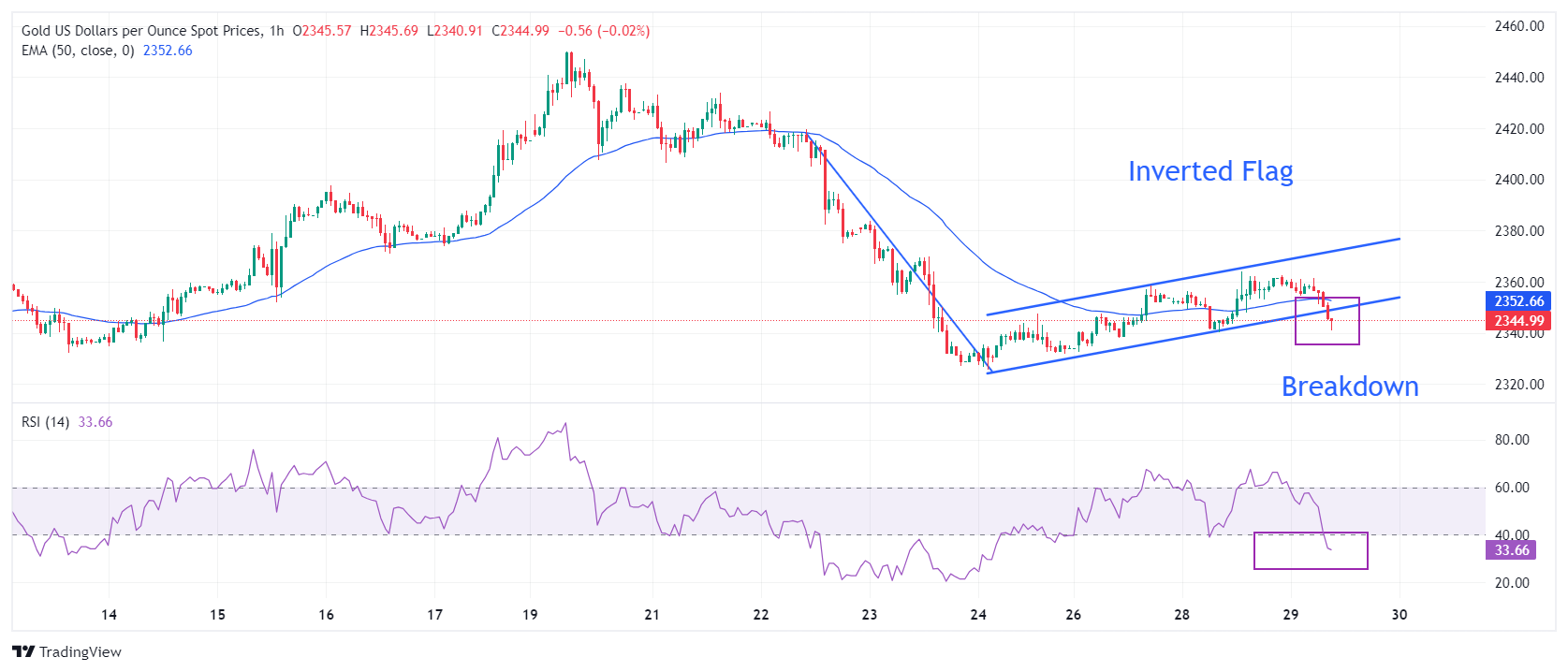Gold price resumes downside as traders turn cautious ahead of US core PCE inflation
- Gold price tumbles to $2,340 as investors worry that Fed rates will remain higher for longer.
- The US Dollar and bond yields rise as traders pare Fed rate-cut bets for September.
- Investors shift focus to the US core PCE price index data for fresh guidance on Friday.
Gold price (XAU/USD) falls sharply to near $2,340 in Wednesday’s European session. The precious metal weakens after the recovery move to near $2,360 stalled. The yellow metal falls back as Federal Reserve (Fed) policymakers emphasize keeping interest rates higher for longer.
Meanwhile, investors turn cautious as the focus shifts to the United States (US) core Personal Consumption Expenditure Price Index (PCE) data for April, which will be published on Friday. The Fed’s preferred inflation measure is forecasted to have grown steadily on both monthly and annual basis at 0.3% and 2.8%, respectively.
The expected growth in the underlying inflation data would prompt the likelihood of interest rates remaining at higher levels. This scenario bodes poorly for the Gold price given that the opportunity cost of holding investments in non-yielding assets, such as Gold, rises. The condition would be favorable for yields on interest-bearing assets and US Dollar.
At the time of writing, the US Dollar rises to 104.70 and the 10-year US Treasury yields post fresh three-week high around 4.57% on cautious market sentiment.
Daily digest market movers: Gold price comes under pressure after Fed Kashkari’s hawkish guidance
- Gold price resumes its downside journey after a short-lived pullback move to near $2,360. The precious metal comes under pressure as traders redeem significant bets favouring the Fed to begin lowering interest rates from the September meeting. The confidence of traders towards the Fed reducing borrowing rates from September has been shaken by the Fed’s hawkish guidance on interest rates.
- The CME FedWatch tool shows that traders see a 46% chance that the central bank will reduce interest rates from their current levels in September. The odds have come down from 57.5% recorded a week ago.
- Fed officials want to be patient with the current interest rate framework as they lack evidence that inflation will sustainably return to the desired rate of 2%. Despite a decline in inflationary pressures in April after remaining hot for the entire first quarter, policymakers want interest rates to remain elevated. Policymakers worry that the slowdown won’t be long-lasting given the strength in the labor market.
- Meanwhile, Fed policymakers are also open to tightening policy further if progress in the disinflation process stalls or price pressures revamp again. On Tuesday, Minneapolis Fed Bank President Neel Kashkari said in an interview with CNBC broadcast, “I think the odds of us raising rates are quite low, but I don’t want to take anything off the table.”
- When asked about what conditions will boost the confidence of the Fed for rate cuts this year, Kaskari said: "Many more months of positive inflation data, I think, to give me confidence that it’s appropriate to dial back," Reuters reported.
Technical Analysis: Gold price delivers an inverted flag breakdown

Gold price weakens after the breakdown of an Inverted Flag chart formation on an hourly timeframe. A breakdown of the above-mentioned chart pattern suggests that the downside trend has resumed after the entry of fresh sellers. The near-term outlook is uncertain as the Gold price has slipped below the 50-period Exponential Moving Average (EMA), which trades around $2,350.
The 14-period Relative Strength Index (RSI) has shifted into the bearish range of 20.00-40.00, suggesting that a bearish momentum has been established.
If the Gold price breaks below the May 24 low of around $2,320, more downside will appear. However, a recovery move above the May 28 high of around $2,365 would put bulls in the driving seat.
Gold FAQs
Gold has played a key role in human’s history as it has been widely used as a store of value and medium of exchange. Currently, apart from its shine and usage for jewelry, the precious metal is widely seen as a safe-haven asset, meaning that it is considered a good investment during turbulent times. Gold is also widely seen as a hedge against inflation and against depreciating currencies as it doesn’t rely on any specific issuer or government.
Central banks are the biggest Gold holders. In their aim to support their currencies in turbulent times, central banks tend to diversify their reserves and buy Gold to improve the perceived strength of the economy and the currency. High Gold reserves can be a source of trust for a country’s solvency. Central banks added 1,136 tonnes of Gold worth around $70 billion to their reserves in 2022, according to data from the World Gold Council. This is the highest yearly purchase since records began. Central banks from emerging economies such as China, India and Turkey are quickly increasing their Gold reserves.
Gold has an inverse correlation with the US Dollar and US Treasuries, which are both major reserve and safe-haven assets. When the Dollar depreciates, Gold tends to rise, enabling investors and central banks to diversify their assets in turbulent times. Gold is also inversely correlated with risk assets. A rally in the stock market tends to weaken Gold price, while sell-offs in riskier markets tend to favor the precious metal.
The price can move due to a wide range of factors. Geopolitical instability or fears of a deep recession can quickly make Gold price escalate due to its safe-haven status. As a yield-less asset, Gold tends to rise with lower interest rates, while higher cost of money usually weighs down on the yellow metal. Still, most moves depend on how the US Dollar (USD) behaves as the asset is priced in dollars (XAU/USD). A strong Dollar tends to keep the price of Gold controlled, whereas a weaker Dollar is likely to push Gold prices up.

